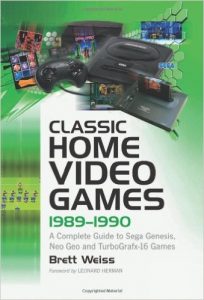Format: Hard/Softcover Publisher: McFarland Size: 344 Pages
 The Internet is rife with forums and sites attempting to categorize the entire library of the Genesis and other consoles in a single, handy source. Some are more successful than others, and there’s always the problem of just how much information should be included. Of course, online sources provide much more room for depth than physical publications, but it’s always good to have a simple, succinct reference on hand to look up titles and other basic information in a pinch.
The Internet is rife with forums and sites attempting to categorize the entire library of the Genesis and other consoles in a single, handy source. Some are more successful than others, and there’s always the problem of just how much information should be included. Of course, online sources provide much more room for depth than physical publications, but it’s always good to have a simple, succinct reference on hand to look up titles and other basic information in a pinch.
For those instances, I’ve found that Classic Home Video Games: 1989-1990 by Brett Weiss proves quite useful. It strips away the comprehensive details that would be more suited to websites, where space is not an issue. Fully aware of its word count, the book instead takes a more general approach and offers the kind of information a researcher would need to reference quickly. The years it covers saw the releases of some of the most classic machines in gaming history, and the thought of a single volume encompassing the Genesis, TurboGrafx-16, and Neo Geo is enough to make most retro gamers foam at the mouth.
Retailing for $39.99 (hardcover) and weighing in at a hefty 344 pages, the third volume in Weiss’s Classic Home Video Games series covers the entire software libraries of the above mentioned consoles. Entries are generally limited to a single, albeit large paragraph that provides general synopsis and an opinion as to its quality. Information for genre, developer, publisher, release year, and number of players is included for each title, as well as whether a game was also released on other formats. The format Weiss selected for his book series owes as much to his obsession with reference books like the Guinness Book of World Records as his love of video games, and combining the two has given him a perfect element for his writing.
In addition to the main consoles covered, the Neo Geo CD, Sega CD, TurboGrafx-16 CD, as well as the Atari Lynx, Game Boy, and 32X are also included in separate appendixes. These sections include each machine’s entire libraries and are limited to entries of a single sentence per game. Personally, I think the handhelds were worthy of a separate volume in their own right, and extending the yearly coverage by a single year would have permitted the inclusion of the third major handheld of the period, the Game Gear. Perhaps this may yet appear in the future, and while it’s nice to have the Lynx and Game Boy included, I would have liked a more comprehensive section for each, given their importance in gaming history. Again, this reduction is likely attributed to the book’s word count more than anything else.
If there is one major observation many people may have with Weiss’s choice of format, it probably has to do with its brevity. The single-paragraph entries may be seen as too short to provide justification for the author’s opinion, and there are sure to be dedicated gamers who question or disagree with them. Personally, I don’t think the book is meant for serious collectors of the machines in question. While it serves as an excellent resource for information such as release dates, publishers, and developers; Classic Home Video Games seems to appeal more to newcomers to the hobby or those who are not as well-versed about gaming history. For instance, in addition to the handheld and add-on appendixes, the book also contains a handy glossary of game-related terms. Overall, the design is very user-friendly, providing quick access to information. It’s clear that Weiss is not trying to create all-encompassing tomes, as such a goal would be unrealistic in today’s Internet world. Instead, he’s looking to give gamers a quick reference guide, not a history book. He states as much in the book’s preface:
The Internet and Digital Press guides have all the tips and tricks anyone needs, and Steven L. Kent (with The Ultimate History of Video games) and Leonard Herman ( with Phoenix :The Fall & Rise of Videogames) have the market cornered on history books and do a much better job of it than I ever could.
Some people may also be turned off by the lack of screen shots for each game and the fact that box art is not included for every entry. Indeed, the lack of visuals may affect the book’s appeal to those accustomed to websites and YouTube, but I read comments online which mentioned that this could be remedied with embedded videos and image galleries in the ebook version. That would definitely be a wonderful thing to have, but the I think the physical book could benefit from some visual appendixes as well. It is likely though, that the inability to include color images, given the sheer amount that would be needed, perhaps fueled the decision to not include them.
 Again, the books in this series are brief by design, and while there are definitely those who will take issue with that, I would suggest they seek out the volumes Weiss himself mentions or look online (Sega-16 is a great starting place!). Honestly, I found Classic Home Video Games to be a great reference to have at arm’s length while writing. For those just looking for casual tomes to use jump-start their collecting, I think these volumes make excellent coffee table books.
Again, the books in this series are brief by design, and while there are definitely those who will take issue with that, I would suggest they seek out the volumes Weiss himself mentions or look online (Sega-16 is a great starting place!). Honestly, I found Classic Home Video Games to be a great reference to have at arm’s length while writing. For those just looking for casual tomes to use jump-start their collecting, I think these volumes make excellent coffee table books.
Classic Home Video Games: 1989-1990 is an excellent book for game historians and newcomers to these consoles to have on their shelves. It makes for a simple read for those just getting into the consoles covered, and arranging the titles in alphabetical order makes researching about game series quick and easy. Sure, one can find more information online, and for that there are a ton of game-related websites readily available, but Weiss has included every single retail release for each console in a single volume. For those seeking basic information about a particular game or series, his book provides a very intuitive and user-friendly means of finding it.
1989-1990, as well as other volumes in the Classic Home Video Games series, can be purchased via McFarland’s website or by phone (800-253-2187) and from Amazon. Information about Weiss and his works can be found at his website.

Recent Comments